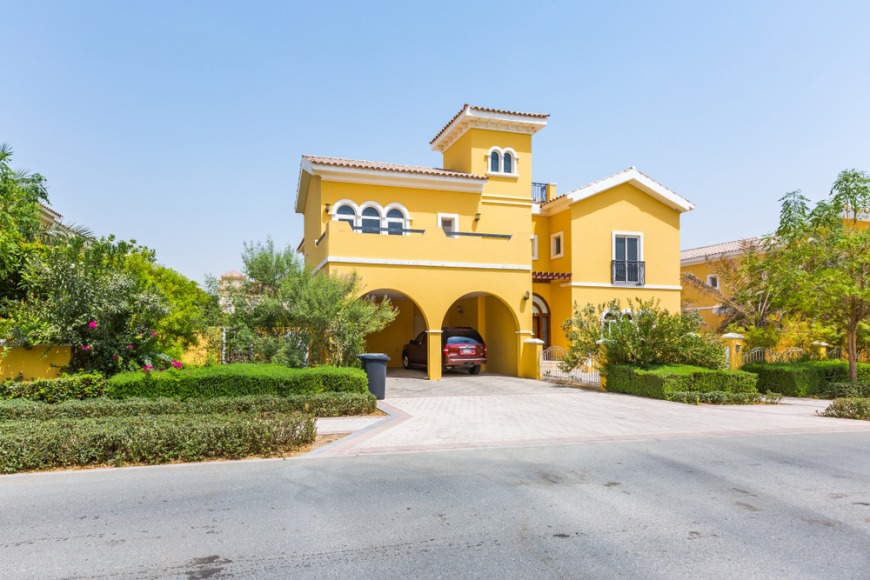Find answers to the questions you've been searching for about insuring your home
21 January 2020
| Last updated on 23 January 2020We take a look at the most frequently asked questions by expats about home insurance.
Year on year in the UAE, particularly Dubai, a large number of newly built apartment complexes and villas are completed to house the ever-growing number of expatriates who have made the UAE their home.
Most, if not all expats, will furnish their apartment or villa with affordable furniture and house fixtures to tailor their home to their liking. But despite this growth, why are only less than half of the populations homes insured?
SEE ALSO: Why every expat in UAE should have contents insurance
To help answer any questions you may have about home insurance in the UAE, here's everything you need to know...
1. Who is home insurance for?
It is a common misconception that home insurance only applies to individuals who own their apartment or villa, and it is these individuals who are able to purchase this type of insurance only.
This is not the case. In fact, tenants in rented properties can also purchase home insurance.
So it's a big yes for both landlords and tenants. The only exception is individuals living in shared accommodations due to the higher risks associated.
2. What does home insurance normally cover?
There are many different types of home insurance providers that can be found in the UAE, but all should cover the following:
- Building: the permanent structure of your home built of brick, concrete, and roofed with incombustible material. It can also include your garage or swimming pool.
- Contents: household items within your home. This includes, but not limited to, your furniture, kitchen appliances, interior decorations, and home electronics.
- Personal Belongings: an optional coverage that typically covers personal items you carry with you frequently and outside your home. This can include, but again is not limited to, your watches, jewellery, laptops, mobile phones, clothes. Most insurers will also extend coverage outside of your home (worldwide) for up to 90 days.
Both tenants and landlords can choose to insure only the building or only the contents, but it is not possible to insure your personal belongings only.

3. How to value your building, contents and personal belongings
Valuing all three aspects can be tricky, particularly when you want to avoid undervaluing your property or belongings. Here are the three main things to consider:
- Building: The value, a.k.a. "sum insured" required is not the original purchase price or current market value of the building, but the rebuilding cost. This is the cost of rebuilding the property in the event that your home is damaged beyond repair.
- Contents: The sum insured is the total current value of all the items you own inside your home. To simplify this, it is the cost of replacement of your home contents if it were all lost in a fire, for example.
- Personal Belongings: Similar to contents, the sum insured for personal belongings should be based on the total current value, i.e. cost of replacing your items classified as 'personal belongings'.
Note: For items that appreciate, like jewellery, it is highly recommended to have these valued on a yearly basis to ensure you are insuring the piece at the right value. After all, the value may have doubled since the initial purchase.
Do I need to provide a breakdown of all my contents and personal belongings?
Most insurance companies require you to list or specify items above a specified limit (more on this below). It is only if the value of a single item exceeds this amount that you're advised to list it and provide a description.
What does Single Article Limit (SAL) mean?
The specified limit varies between insurers, and applies to both contents and personal belongings cover. Some existing limits in the market can range from AED 2,000 up to AED 40,000.
The limit is the maximum amount an insurer will pay for a single valuable item in the event of a claim.
If your insurer's single article limit for personal belongings is AED 10,000 and you happen to own a watch worth AED 18,000 and it's not listed in your policy, your insurance would only cover AED 10,000 at the time of a claim.
What if I don’t have the receipts or invoices? Can I still purchase home insurance?
You can still ensure your home and belongings without these documents upon signing up.
SEE ALSO: How to choose your home insurance in the UAE
Saying that receipts or invoices serve as 'proof of value', and are very important as supporting documents at the time of a claim. Make it a habit to keep an inventory of your contents and personal belongings. Update valuation letters or certificates, and even keep photographs that can be safeguarded to support a claim.
4. What is the excess, and how does it affect your claim?
The excess (deductible) varies between insurers and applies to all three standard coverages.
This is the amount that is shouldered by the insured and is applicable for each and every claim. It is not an amount that will be paid upfront for a valid claim, but rather the amount that will be deducted from the total claim amount payable.
Generally, building policies have an excess of AED 1,000, and contents and personal belongings have excesses around AED 250. In addition, most insurers will also have an additional excess of 10% for items that exceed the SAL over and above the minimum excess.

5. How much you get at the time of a claim
- Building: If your apartment or villa were destroyed in a fire, resulting in a total loss, the amount you would be covered in terms of the building would be the sum insured (rebuilding value), minus the excess.
- Contents and Personal Belongings: These are items that are beyond repair, which are replaced on a 'new-for-old' basis. This is a general rule of thumb for both types covered under the total sum insured, and are not valued above the SAL. For example, if your phone had been accidentally damaged and you make a claim for it, provided that it is beyond a repairable state, you would be covered up to the current market value of that exact or similar model.
Listed Items Above the SAL
For items above the SAL and are listed on the policy with a specified value, provided that the item cannot be restored or repaired, the claim amount payable would be the value specified on the policy, minus the applicable excess.
If you owned a watch worth AED 35,000 and your policy’s SAL was AED 10,000, provided this was listed on the policy and it was beyond restoration or repair, you would be covered up to the listed or specified value. Keep in mind that insurers expect a receipt, invoice or valuation certificate to further support the value specified on the policy for items that fall under this category.
Note:Remember that insurance is meant to financially restore you in the same position prior to the loss or damage of the claimed item and is not a financial instrument meant for profit.
6. How much are typical premiums? What factors affect them?
Building ratings range from 0.02% to 0.07%. Major insurers typically rate contents from 0.30% to 0.50%.
Personal belongings are rated between 0.90% and 1.50%. The reason for the high rating is due to the higher risk associated with personal belongings as against contents which are things inside the home and so lessens the possibility of theft or accidental damage.
Keep scrolling to take a look at the main factors that can affect premiums...
Claims
If you’ve had home insurance claims in the past, this would most likely affect your quote though it does still depend on the gravity of the claim and how long ago it had happened. If the claim was a relatively small amount, insurers will sometimes increase the premium.
SEE ALSO: How to avoid a nasty insurance suprise in UAE
Insurers expect you to declare any claims you’ve suffered in the past six months to one year, the latter range depending on the insurer. Non-declaration could result in the rejection of a future claim or even cancellation of the policy.
Optional Covers
Personal Belongings is one of the standard coverages offered by all insurers but is completely optional. Compared to contents, personal belongings are rated much higher, which simply means that the higher the sum insured, the higher the premium.
Domestic Help is coverage extended to your help inside the home and includes a payout in case of accidental bodily injury. It usually comes at a premium of AED 100.
Loss of Documents is optional for some insurers, though others have automatically built in this benefit. This cover would in case of accidental damage or loss of identification documents such as your passport, license or work permits.
Your Preferred Insurer
Major and international insurers who have been offering home insurance for years in the UAE have a bit more flexibility in providing complete and comprehensive benefits at very competitive rates as a result of experience and presence in the market.
With a bigger book of clients for home insurance, the risk is easily mediated compared to small players.
While other insurance companies might presently provide unbelievably low prices, the key point to remember when selecting your insurance company is to be confident that it has the financial capability to cover you when the unexpected happens and you need to make a claim.
Your Preferred Broker
There are thousands of brokerages in the market and the years a broker has been in the market alongside their relationship of trust with insurance companies are some main factors to look out for when consider when selecting a broker.
The greater the experience and the trust, the greater are the chances of securing the best rate. Some brokerages even go the extra mile and commit to assisting you at the time of a claim at no additional charge.
:: Another factor that can affect your insurance claim is whether you undervalued your belongings, which is something you should NOT do when taking out a policy. For more information on undervaluing your belongings, click here.

7. Main liabilities covered by home insurance
- Owner’s liability to the public covers you as the building owner for any accidental injury or damage to a third party person or property that had started in your own property.
- Occupier’s personal liability is an interesting cover that is similar to the Owner’s liability, except that this applies to the occupant of the building and even extends to a worldwide coverage up to 90 days during the insurance period.
- Tenant’s liability is a beneficial cover for tenants in case of any accidental loss or damages that makes them liable to their landlord.
8. What are home exclusions?
Generally, the following things are excluded from insurance policies:
- Loss/damage resulting from war/terrorist activities
- Loss or damage due to wear and tear, depreciation or any other gradually operating cause
- Liability arising out of any mechanically propelled vehicles
- Any incident or loss involving radioactivity
- Loss, destruction or damage caused by sonic bangs
- Cyber risks and associated perils
This list is by no means exhaustive, each underwriter has its own conditions and exclusions – it’s best to always check the policy booklet.





























































































![We Tried [u]bk's Lively Garden Brunch at Mövenpick JLT Dubai We Tried [u]bk's Lively Garden Brunch at Mövenpick JLT Dubai](https://cdnexpatwomanfood.expatwoman.com/s3fs-public/urban%20bar%20and%20kitchen%20brunch%20main.png)








































